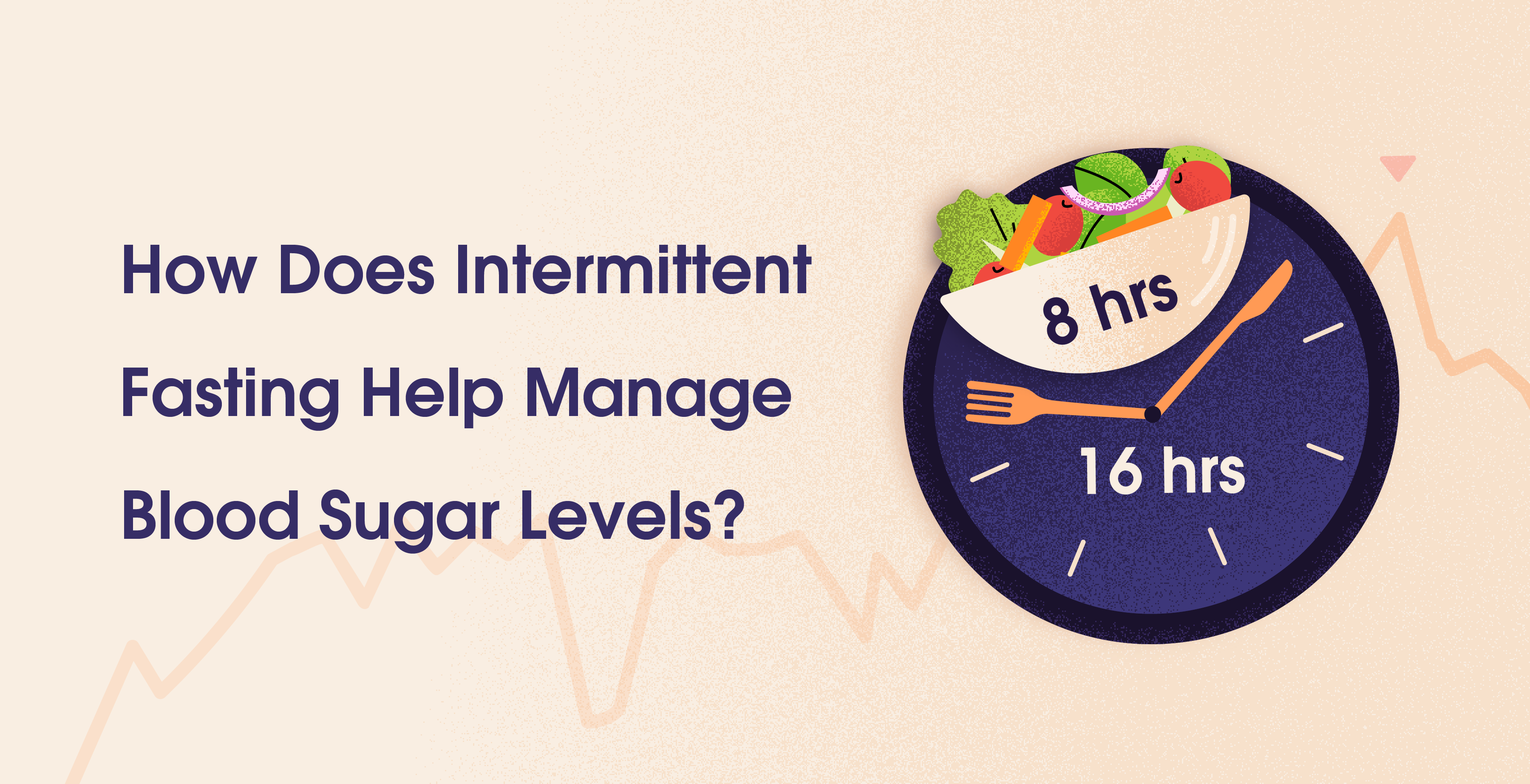Prediabetes Self-care Guide
Mar 7, 2024
Ashima Raizada



Table Of Contents
If you're dealing with prediabetes, this guide is your go-to. We know it can feel like you've tried everything to manage it, and it's tough to figure out what works best. But don't worry, we're here to simplify things for you.
Prediabetes is a real deal, with consequences ranging from energy crashes to potential heart issues if it progresses to diabetes. But here's the good news: you're still in the prediabetes stage, which means there's plenty you can do to keep it from becoming full-blown diabetes. By making some lifestyle changes, you've got a real shot at slowing down or even stopping diabetes from taking hold.
In this guide, we'll give you practical tips to help you live healthier. We'll talk about why self-care matters when you've got prediabetes, and we'll share some easy tricks to manage it day-to-day. Our goal is to give you the tools and know-how to tackle prediabetes like a champ.
Highlights
Prediabetes is a condition where blood sugar is higher than usual but not diabetic.
Healthy lifestyle choices, including a balanced diet and regular exercise, prevent prediabetes.
Progression to type 2 diabetes, heart disease, and other health complications may occur if prediabetes remains unmanaged.
Lifestyle changes such as diet and exercise can often reverse prediabetes.
Importance of self-care when you are prediabetic
When you're facing prediabetes, self-care becomes incredibly important. Consider this: over 98 million American adults, which is more than a third of all adults, are affected by prediabetes. (1) But here's the thing: many of us aren't clear on what self-care measures we should be taking to address it.
Let's see the reasons:
Prevention of Type 2 Diabetes
Prediabetes signals potential type 2 diabetes. So, think of prediabetes as a warning sign. Self-care prevents progression and your healthy lifestyle changes now might stop full-blown diabetes later.
Blood Sugar Control
Balanced diets and regular exercise are essential for stable blood sugar. They help prevent your blood sugar level from going on a roller coaster ride - up and down, ensuring steady and balanced levels.
Weight Management
Maintaining a healthy weight is critical to managing prediabetes. Mindful eating and regular activity in your self-care toolkit help manage weight. Eat wise, move more - you've got this!
Improved Insulin Sensitivity
Lifestyle changes, such as regular exercise, healthy eating, and many more enhance your insulin sensitivity and ultimately manage prediabetes.
Reduced Risk of Complications
Lowering the risk of complications is crucial because unmanaged prediabetes can lead to chronic issues like heart disease and nerve damage. Practicing self-care measures can reduce the risks and promote better overall health.
Enhanced Well-Being
Self-care is not just about numbers; it's about feeling great. Self-care habits, like managing stress and getting sufficient sleep, contribute to an improved quality of life.
Empowerment and Control
Self-care empowers you, letting you actively participate in your well-being. Imagine being in control - pretty cool, right? It's your ticket to feeling empowered and fabulous.
Simple self-care techniques can help manage prediabetes without medication
When it comes to dealing with prediabetes, taking control of your health is truly empowering. And the good news is, there are effective strategies that don't involve medication. Let's discuss some simple self-care techniques that can help manage prediabetes and lead to a healthier, more balanced lifestyle.
Lifestyle Modification
When it comes to managing your lifestyle, especially if you're navigating the waters of prediabetes, there are two pillars you can't ignore: your diet and your physical activity. Let's talk about nutrition first. By focusing on meals that are rich in fiber and packed with protein, you're setting yourself up to effectively dampen those unwanted glucose spikes. This balance is key in maintaining steady blood sugar levels. Don't forget to weave in plenty of whole foods to round out your diet. This combination doesn't just help with glucose control; it lays the foundation for overall health and well-being in the face of prediabetes.
Research published by the NCBI (National Center of Biotechnology Information) talks about the importance of physical activity for people with prediabetes. (2) Let's explore simple ways to integrate exercise into your daily routine seamlessly.
Take a Stroll: Sneak in a daily 30-minute brisk walk - it's simple, effective, and you don't need a gym membership. Plus, it's a fantastic way to clear your mind and get some fresh air.
Living Room Workouts: Transform your living room into a workout zone with bodyweight exercises or yoga. It's fitness on your terms, right in the comfort of your home.
Active Commuting: Turn your daily commute into a workout by cycling or strolling. It's multitasking at its healthiest, making your journey productive and fitness-friendly.
Stair climbing: Forget the elevator; conquer the stairs! A simple climb is a quick activity that adds up, giving your legs a workout and boosting your heart rate.
Desk exercise Breaks: Spice up your workday with desk exercises, like seated leg lifts or desk push-ups. It's a fun way to stay active and break up long periods of sitting.
Stress Management
Stress is like a coach - pushing us to reach our full potential. But too much of it can turn the guiding coach into an overwhelming force. The connection between stress and prediabetes is not obvious.
However, this research found that prolonged stress can lead to insulin resistance, a weak immune system, and glucose imbalance, potentially leading to prediabetes. Plus, it tricks us into craving sugary treats, creating a wild blood sugar rollercoaster.
Now that we've uncovered the tricky side of stress, we've also got you some good news - Dr. Stan Hyman's stress-buster techniques:
Strategic Time Management: Juggle your time like a pro! Efficiently handle time, tasks, and records, give yourself a breather by allocating extra time, and sprinkle in daily moments to relax and clear your mind for optimal stress relief.
Decision-Making for Stress Reduction: Be the boss of decisions! Don't let indecision distract you. Evaluate the long-term impact before diving into stressful situations, ensuring your energy goes where it truly matters.
Effective Communication and Flexibility: Cultivate assertive communication and avoid resentment. Flexibility is your secret sauce - negotiate satisfaction by blending assertiveness with compromise in your interactions.
Mind-Body Practices for Daily Well-being: Get that body moving! Exercise in any form is your stress-buster. Add quick relaxation exercises for your calm mind - a daily recipe for mental and physical wellness.
Holistic Well-being Practices: Take charge! Confront procrastination, tidy up your surroundings, and maintain a positive mindset. It's the holistic approach - address your fears, streamline, and keep that positive vibe alive! (3)
Weight Management
According to the Obesity Action Coalition, excess weight is a significant risk factor for prediabetes. (4) The extra pounds can lead to insulin resistance, a key player in prediabetes development. Let's explore practical weight management tips to tackle prediabetes head-on.
Balanced Eating Approach: When dealing with prediabetes, think steady changes over extreme fad diets. Small shifts make lasting impacts, creating a lifestyle that's easy to stick to and delivers sustained results.
Mediterranean Gold Standard: Meet your dietary friend: the Mediterranean diet, is packed with whole grains, lean proteins, and healthy fats. Follow ADA meal proportions with 50% non-starchy vegetables, 25% healthy carbs, and 25% lean protein. (5)
Hydration Matters: Ditch the sugary sips for water. Hydrating right isn't just good for overall health - it's a secret weapon for mastering prediabetes and overall health.
Sugar Awareness: Craving sweets? Skip the sugary snacks. Control portion sizes, especially with refined carbohydrates, for effective prediabetes management and improved well-being.
Fiber-Rich Choices: Meet your daily fiber goal - 25 to 30 grams. Eat your fruits, veggies, and whole grains; they're the heroes of a balanced diet. (6) Remember, all foods can fit - just keep monitoring portion sizes.
Saturated Fats Check Time for some fat talk! Go for lean proteins and low-fat dairy. When it comes to ginseng, ginkgo, and garlic, think in moderation to avoid potential low blood sugar.
Individualized Plans: Here's the spotlight move - personalized plans! Customized counseling, tailored strategy, and effective goal achievement with platforms like Trst Health can be a game changer in your prediabetes journey.
Sufficient Sleep
Proper sleep is your body's nightly reset button. It enhances cognitive function, boosts mood, and supports overall well-being. It acts as a stress shield and regulates stress hormones, keeping them in check.
According to research, improper sleep throws your body's glucose management into disarray. It can lead to insulin resistance, causing blood sugar spikes. (7)
Here are some of the tips for a night of restful sleep:
Sunlight Exposure for Circadian Rhythms: Ever wonder why sunlight feels so good in the morning? It kickstarts your body's internal clock, suppressing melatonin and enhancing alertness. Sunlight in the afternoon signals bedtime is on the horizon.
Consistent Wake-Up and Bedtimes: Think of your body as a creature of habit - it loves routines! Keeping a steady sleep schedule syncs with your body's rhythm. This consistency and exclusive bed use for sleep ensures restful slumber.
No Caffeine Before Bed: Coffee is excellent in the morning, but it's like a party crasher at bedtime. Caffeine disrupts adenosine receptors, hindering sleepiness induction. So, let's agree - no caffeine at least 9 hours before bed.
Optimal Nap Duration: Naps are like power-ups, but let's not overdo it. Short naps, like the 15-30 minute kind, refresh without sleep inertia. Longer naps? They cause health troubles.
Limit Alcohol Consumption: A glass of wine might make you feel cozy, but it's not the best sleep buddy. Alcohol can disrupt sleep balance. Limiting alcohol ensures your sleep is smooth and uninterrupted.
Consider Sleep-Boosting Supplements: Meet Magnesium Threonate, Apigenin, and Theanine. They're important for relaxation. Magnesium supports overall sleep, apigenin calms, and theanine influences neurotransmitters.
Create an Ideal Sleep Environment: Your bedroom is the main center for your sleep. A dark, cool bedroom encourages melatonin production. Keep it dark, cool, and comfy for the ultimate restful sleep. (8)
Are Medications necessary in managing Prediabetes?
With prediabetes, your lifestyle changes, including maintaining a healthy diet and nutrition, weight, exercise, circadian rhythm, and sleep hygiene play an important role. Your efforts to get healthy naturally will and should always be your first option.
But sometimes, we see that even with maintaining a healthy lifestyle and proper nutrition, the body needs external help in the form of medicines. The prediabetes medicines normalize sugar levels and regularize the insulin in your body for better results. Also, prediabetes medications reduce the risk of various disorders that come along with diabetes like stroke, cardiovascular diseases, chronic renal disease, obesity and hypertension. (9)
Read more about prediabetes medication here.
However, it's important to remember that prioritizing your healthy lifestyle is a must in winning against prediabetes.
When should you start self-care in the prediabetes journey?
The question of when to start self-care is met with a resounding "now." Self-care seamlessly integrates into your life, regardless of age or the stage of your diabetes journey.
Here are some checklists for you to start your self-care journey as soon as you can:
Having a family member with a positive family history of type 2 diabetes
Had diagnosed with prediabetes recently
Suffering from blurry vision
Increased urination
Had diabetes while you were pregnant
Experiencing unclear eyesight
Wounds are showing delayed healing
Persistent feelings of thirst and hunger
Dealing with excessive fatigue
With these pointers, you're ready to check yourself and start your self-care journey immediately. Self-care is your sidekick, fitting into your life, no matter your age or diabetes journey.
Other ways to manage Prediabetes
There are some additional strategies to be ahead of your prediabetes growth. These are things you need to do in addition to making a difference in your health in managing prediabetes. Let's dig into these options, each one adding its touch to boost your overall well-being:
Professional Guidance
Your healthcare team acts as seasoned guides in your journey to better health. A consultation with your primary care or endocrinologist provides expert insights tailored to your health. Along with that, diabetes educators and diabetes prevention programs are like having a personalized roadmap directing you toward optimal well-being. From digital health coaches like Trst Health, you can receive help from experts in prediabetes management.
Medication
Medications are a strategic move in blood sugar control in certain instances. Your healthcare provider will clarify if this aligns with your health objectives or not.
Regular Monitoring: Navigating Blood Sugar
Regular blood sugar monitoring is an important aspect of your prediabetes journey. There are diagnostic tests like the HbA1C test, Fasting plasma glucose test, Random plasma glucose test, and Oral glucose tolerance test necessary to monitor your blood glucose levels during treatment. However, self-monitoring and documentation of blood sugar levels is widely believed to improve the control of blood glucose levels and health outcomes in the long term. It is believed that adults with any type of diabetes should check their glucose level at least once daily. (10)
Behavioural Therapy
According to scientific studies, if you are diabetic it is more likely you are more prone to psychological illnesses like depression, anxiety disorders, and eating disorders, and this cognitive behavioral therapy will help you out. (11) Behavioral therapy unravels the mind-body connection. It's a guide to understanding your choices, equipping you with strategies for healthier decisions.
Regular Health Checkups: Strategic Halts
Routine health checkups are strategic pauses in your life's narrative. Eye exams, blood pressure checks, and cholesterol screenings are meticulous routines for your body. Scheduling these checkups is necessary for your future wellness.
Remember, it's a journey of progress, not perfection. These strategies are your helper for a healthier and fulfilled you.
Conclusion
In your journey of managing prediabetes, the power of self-care emerges as your guiding force to better health and improved well-being. So it's high time to delve into healthy lifestyle modifications, stress management, weight control, and sufficient sleep. From simple exercises to stress-busting strategies and personalized nutrition plans, each effort contributes to a comprehensive self-care guide. Your prediabetes self-care journey is not just a necessity; it's a choice toward empowerment of a healthy life, and it begins now!
References
If you're dealing with prediabetes, this guide is your go-to. We know it can feel like you've tried everything to manage it, and it's tough to figure out what works best. But don't worry, we're here to simplify things for you.
Prediabetes is a real deal, with consequences ranging from energy crashes to potential heart issues if it progresses to diabetes. But here's the good news: you're still in the prediabetes stage, which means there's plenty you can do to keep it from becoming full-blown diabetes. By making some lifestyle changes, you've got a real shot at slowing down or even stopping diabetes from taking hold.
In this guide, we'll give you practical tips to help you live healthier. We'll talk about why self-care matters when you've got prediabetes, and we'll share some easy tricks to manage it day-to-day. Our goal is to give you the tools and know-how to tackle prediabetes like a champ.
Highlights
Prediabetes is a condition where blood sugar is higher than usual but not diabetic.
Healthy lifestyle choices, including a balanced diet and regular exercise, prevent prediabetes.
Progression to type 2 diabetes, heart disease, and other health complications may occur if prediabetes remains unmanaged.
Lifestyle changes such as diet and exercise can often reverse prediabetes.
Importance of self-care when you are prediabetic
When you're facing prediabetes, self-care becomes incredibly important. Consider this: over 98 million American adults, which is more than a third of all adults, are affected by prediabetes. (1) But here's the thing: many of us aren't clear on what self-care measures we should be taking to address it.
Let's see the reasons:
Prevention of Type 2 Diabetes
Prediabetes signals potential type 2 diabetes. So, think of prediabetes as a warning sign. Self-care prevents progression and your healthy lifestyle changes now might stop full-blown diabetes later.
Blood Sugar Control
Balanced diets and regular exercise are essential for stable blood sugar. They help prevent your blood sugar level from going on a roller coaster ride - up and down, ensuring steady and balanced levels.
Weight Management
Maintaining a healthy weight is critical to managing prediabetes. Mindful eating and regular activity in your self-care toolkit help manage weight. Eat wise, move more - you've got this!
Improved Insulin Sensitivity
Lifestyle changes, such as regular exercise, healthy eating, and many more enhance your insulin sensitivity and ultimately manage prediabetes.
Reduced Risk of Complications
Lowering the risk of complications is crucial because unmanaged prediabetes can lead to chronic issues like heart disease and nerve damage. Practicing self-care measures can reduce the risks and promote better overall health.
Enhanced Well-Being
Self-care is not just about numbers; it's about feeling great. Self-care habits, like managing stress and getting sufficient sleep, contribute to an improved quality of life.
Empowerment and Control
Self-care empowers you, letting you actively participate in your well-being. Imagine being in control - pretty cool, right? It's your ticket to feeling empowered and fabulous.
Simple self-care techniques can help manage prediabetes without medication
When it comes to dealing with prediabetes, taking control of your health is truly empowering. And the good news is, there are effective strategies that don't involve medication. Let's discuss some simple self-care techniques that can help manage prediabetes and lead to a healthier, more balanced lifestyle.
Lifestyle Modification
When it comes to managing your lifestyle, especially if you're navigating the waters of prediabetes, there are two pillars you can't ignore: your diet and your physical activity. Let's talk about nutrition first. By focusing on meals that are rich in fiber and packed with protein, you're setting yourself up to effectively dampen those unwanted glucose spikes. This balance is key in maintaining steady blood sugar levels. Don't forget to weave in plenty of whole foods to round out your diet. This combination doesn't just help with glucose control; it lays the foundation for overall health and well-being in the face of prediabetes.
Research published by the NCBI (National Center of Biotechnology Information) talks about the importance of physical activity for people with prediabetes. (2) Let's explore simple ways to integrate exercise into your daily routine seamlessly.
Take a Stroll: Sneak in a daily 30-minute brisk walk - it's simple, effective, and you don't need a gym membership. Plus, it's a fantastic way to clear your mind and get some fresh air.
Living Room Workouts: Transform your living room into a workout zone with bodyweight exercises or yoga. It's fitness on your terms, right in the comfort of your home.
Active Commuting: Turn your daily commute into a workout by cycling or strolling. It's multitasking at its healthiest, making your journey productive and fitness-friendly.
Stair climbing: Forget the elevator; conquer the stairs! A simple climb is a quick activity that adds up, giving your legs a workout and boosting your heart rate.
Desk exercise Breaks: Spice up your workday with desk exercises, like seated leg lifts or desk push-ups. It's a fun way to stay active and break up long periods of sitting.
Stress Management
Stress is like a coach - pushing us to reach our full potential. But too much of it can turn the guiding coach into an overwhelming force. The connection between stress and prediabetes is not obvious.
However, this research found that prolonged stress can lead to insulin resistance, a weak immune system, and glucose imbalance, potentially leading to prediabetes. Plus, it tricks us into craving sugary treats, creating a wild blood sugar rollercoaster.
Now that we've uncovered the tricky side of stress, we've also got you some good news - Dr. Stan Hyman's stress-buster techniques:
Strategic Time Management: Juggle your time like a pro! Efficiently handle time, tasks, and records, give yourself a breather by allocating extra time, and sprinkle in daily moments to relax and clear your mind for optimal stress relief.
Decision-Making for Stress Reduction: Be the boss of decisions! Don't let indecision distract you. Evaluate the long-term impact before diving into stressful situations, ensuring your energy goes where it truly matters.
Effective Communication and Flexibility: Cultivate assertive communication and avoid resentment. Flexibility is your secret sauce - negotiate satisfaction by blending assertiveness with compromise in your interactions.
Mind-Body Practices for Daily Well-being: Get that body moving! Exercise in any form is your stress-buster. Add quick relaxation exercises for your calm mind - a daily recipe for mental and physical wellness.
Holistic Well-being Practices: Take charge! Confront procrastination, tidy up your surroundings, and maintain a positive mindset. It's the holistic approach - address your fears, streamline, and keep that positive vibe alive! (3)
Weight Management
According to the Obesity Action Coalition, excess weight is a significant risk factor for prediabetes. (4) The extra pounds can lead to insulin resistance, a key player in prediabetes development. Let's explore practical weight management tips to tackle prediabetes head-on.
Balanced Eating Approach: When dealing with prediabetes, think steady changes over extreme fad diets. Small shifts make lasting impacts, creating a lifestyle that's easy to stick to and delivers sustained results.
Mediterranean Gold Standard: Meet your dietary friend: the Mediterranean diet, is packed with whole grains, lean proteins, and healthy fats. Follow ADA meal proportions with 50% non-starchy vegetables, 25% healthy carbs, and 25% lean protein. (5)
Hydration Matters: Ditch the sugary sips for water. Hydrating right isn't just good for overall health - it's a secret weapon for mastering prediabetes and overall health.
Sugar Awareness: Craving sweets? Skip the sugary snacks. Control portion sizes, especially with refined carbohydrates, for effective prediabetes management and improved well-being.
Fiber-Rich Choices: Meet your daily fiber goal - 25 to 30 grams. Eat your fruits, veggies, and whole grains; they're the heroes of a balanced diet. (6) Remember, all foods can fit - just keep monitoring portion sizes.
Saturated Fats Check Time for some fat talk! Go for lean proteins and low-fat dairy. When it comes to ginseng, ginkgo, and garlic, think in moderation to avoid potential low blood sugar.
Individualized Plans: Here's the spotlight move - personalized plans! Customized counseling, tailored strategy, and effective goal achievement with platforms like Trst Health can be a game changer in your prediabetes journey.
Sufficient Sleep
Proper sleep is your body's nightly reset button. It enhances cognitive function, boosts mood, and supports overall well-being. It acts as a stress shield and regulates stress hormones, keeping them in check.
According to research, improper sleep throws your body's glucose management into disarray. It can lead to insulin resistance, causing blood sugar spikes. (7)
Here are some of the tips for a night of restful sleep:
Sunlight Exposure for Circadian Rhythms: Ever wonder why sunlight feels so good in the morning? It kickstarts your body's internal clock, suppressing melatonin and enhancing alertness. Sunlight in the afternoon signals bedtime is on the horizon.
Consistent Wake-Up and Bedtimes: Think of your body as a creature of habit - it loves routines! Keeping a steady sleep schedule syncs with your body's rhythm. This consistency and exclusive bed use for sleep ensures restful slumber.
No Caffeine Before Bed: Coffee is excellent in the morning, but it's like a party crasher at bedtime. Caffeine disrupts adenosine receptors, hindering sleepiness induction. So, let's agree - no caffeine at least 9 hours before bed.
Optimal Nap Duration: Naps are like power-ups, but let's not overdo it. Short naps, like the 15-30 minute kind, refresh without sleep inertia. Longer naps? They cause health troubles.
Limit Alcohol Consumption: A glass of wine might make you feel cozy, but it's not the best sleep buddy. Alcohol can disrupt sleep balance. Limiting alcohol ensures your sleep is smooth and uninterrupted.
Consider Sleep-Boosting Supplements: Meet Magnesium Threonate, Apigenin, and Theanine. They're important for relaxation. Magnesium supports overall sleep, apigenin calms, and theanine influences neurotransmitters.
Create an Ideal Sleep Environment: Your bedroom is the main center for your sleep. A dark, cool bedroom encourages melatonin production. Keep it dark, cool, and comfy for the ultimate restful sleep. (8)
Are Medications necessary in managing Prediabetes?
With prediabetes, your lifestyle changes, including maintaining a healthy diet and nutrition, weight, exercise, circadian rhythm, and sleep hygiene play an important role. Your efforts to get healthy naturally will and should always be your first option.
But sometimes, we see that even with maintaining a healthy lifestyle and proper nutrition, the body needs external help in the form of medicines. The prediabetes medicines normalize sugar levels and regularize the insulin in your body for better results. Also, prediabetes medications reduce the risk of various disorders that come along with diabetes like stroke, cardiovascular diseases, chronic renal disease, obesity and hypertension. (9)
Read more about prediabetes medication here.
However, it's important to remember that prioritizing your healthy lifestyle is a must in winning against prediabetes.
When should you start self-care in the prediabetes journey?
The question of when to start self-care is met with a resounding "now." Self-care seamlessly integrates into your life, regardless of age or the stage of your diabetes journey.
Here are some checklists for you to start your self-care journey as soon as you can:
Having a family member with a positive family history of type 2 diabetes
Had diagnosed with prediabetes recently
Suffering from blurry vision
Increased urination
Had diabetes while you were pregnant
Experiencing unclear eyesight
Wounds are showing delayed healing
Persistent feelings of thirst and hunger
Dealing with excessive fatigue
With these pointers, you're ready to check yourself and start your self-care journey immediately. Self-care is your sidekick, fitting into your life, no matter your age or diabetes journey.
Other ways to manage Prediabetes
There are some additional strategies to be ahead of your prediabetes growth. These are things you need to do in addition to making a difference in your health in managing prediabetes. Let's dig into these options, each one adding its touch to boost your overall well-being:
Professional Guidance
Your healthcare team acts as seasoned guides in your journey to better health. A consultation with your primary care or endocrinologist provides expert insights tailored to your health. Along with that, diabetes educators and diabetes prevention programs are like having a personalized roadmap directing you toward optimal well-being. From digital health coaches like Trst Health, you can receive help from experts in prediabetes management.
Medication
Medications are a strategic move in blood sugar control in certain instances. Your healthcare provider will clarify if this aligns with your health objectives or not.
Regular Monitoring: Navigating Blood Sugar
Regular blood sugar monitoring is an important aspect of your prediabetes journey. There are diagnostic tests like the HbA1C test, Fasting plasma glucose test, Random plasma glucose test, and Oral glucose tolerance test necessary to monitor your blood glucose levels during treatment. However, self-monitoring and documentation of blood sugar levels is widely believed to improve the control of blood glucose levels and health outcomes in the long term. It is believed that adults with any type of diabetes should check their glucose level at least once daily. (10)
Behavioural Therapy
According to scientific studies, if you are diabetic it is more likely you are more prone to psychological illnesses like depression, anxiety disorders, and eating disorders, and this cognitive behavioral therapy will help you out. (11) Behavioral therapy unravels the mind-body connection. It's a guide to understanding your choices, equipping you with strategies for healthier decisions.
Regular Health Checkups: Strategic Halts
Routine health checkups are strategic pauses in your life's narrative. Eye exams, blood pressure checks, and cholesterol screenings are meticulous routines for your body. Scheduling these checkups is necessary for your future wellness.
Remember, it's a journey of progress, not perfection. These strategies are your helper for a healthier and fulfilled you.
Conclusion
In your journey of managing prediabetes, the power of self-care emerges as your guiding force to better health and improved well-being. So it's high time to delve into healthy lifestyle modifications, stress management, weight control, and sufficient sleep. From simple exercises to stress-busting strategies and personalized nutrition plans, each effort contributes to a comprehensive self-care guide. Your prediabetes self-care journey is not just a necessity; it's a choice toward empowerment of a healthy life, and it begins now!
References
Table Of Contents
Table Of Contents
Table Of Contents
Read More


Mar 25, 2025
Sayfali Rawlani


Mar 20, 2025
Sayfali Rawlani


Mar 6, 2025
Sayfali Rawlani



Company
Copyright © 2025 trst health. All right reserved.

